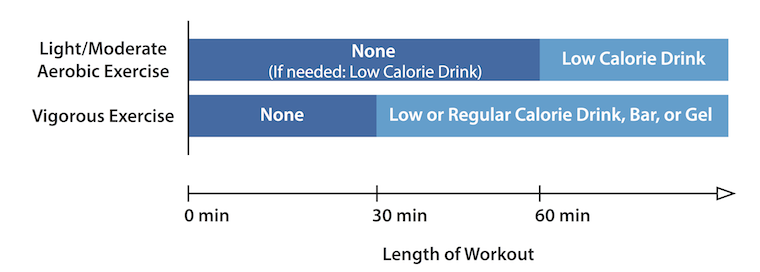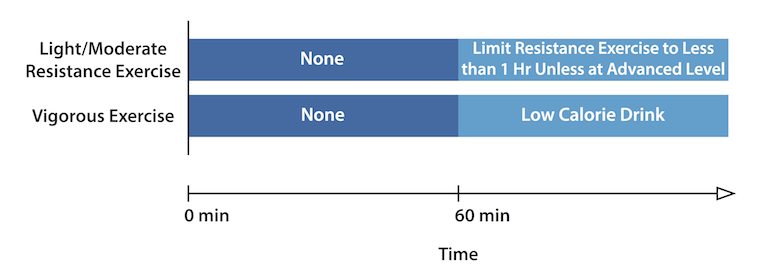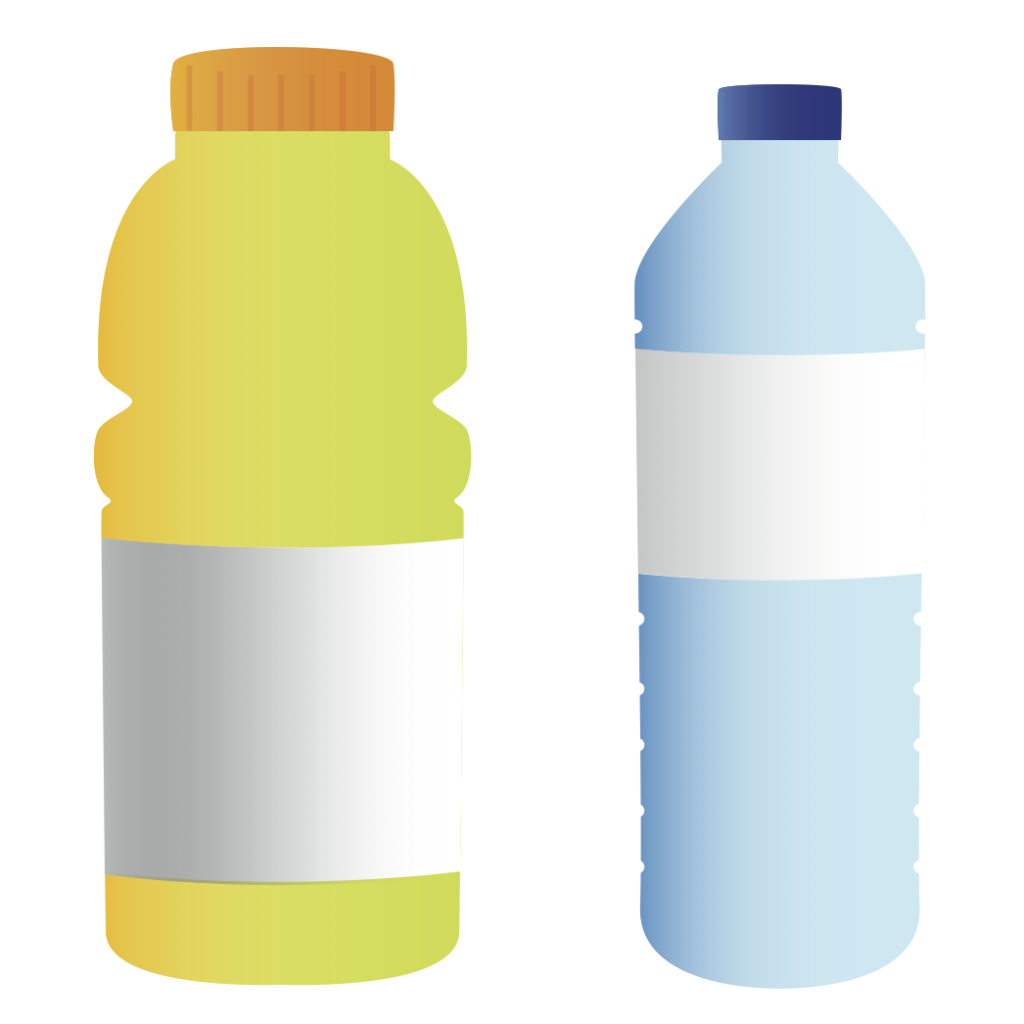The following article provides details on the optimal workout nutrition for before, during, and after exercise for both aerobic and resistance exercise to help you maximize your aerobic and resistance exercise as well as your post-exercise recovery.
Workout Nutrition for Aerobic Exercise
♦ Aerobic Exercise: Pre Workout Nutrition
An individual burns more energy, and consequently glucose, during aerobic exercise than during resistance exercise of similar intensity. Consequently, it is more important to consume slow-releasing, complex carbohydrates before an aerobic exercise routine. Slow-releasing, complex carbohydrates will provide energy and stabilize blood glucose levels throughout the workout. Additionally, adding a small amount of protein to your pre workout nutrition helps to speed amino acid delivery to recovering muscles. However, one should not overdo the protein, as excess protein can be quite heavy and impede an aerobic workout. (See Carbohydrates & Protein).
Overall, the best thing to eat prior to resistance training is a low-fat snack 1-4 hours before the workout. This snack should provide slow-releasing carbohydrates to help stabilize blood sugar levels and a small amount of quality protein to help provide amino acids necessary for muscle repair after training.
- If you eat 1 hour before resistance training, choose a snack that is easily digestible.
- If you eat 2-4 hours before resistance training, choose a well-balanced, light meal.
Avoid Fast-Acting Carbohydrates And Fats
Many men think they need fast-acting simple carbohydrates prior to aerobic exercise. However, fast-acting simple carbohydrates like sports drinks, candy bars, white bread, and white rice can rapidly increase blood glucose levels. This increase can potentially be followed by a period of hypoglycemia, a state of low blood sugar, as the body tries to compensate. It is best to avoid these fast-acting carbohydrate sources prior to exercise. It is also important to avoid fats. While certain fats are an important part of a healthy diet, consuming foods high in fat can impede or slow digestion potentially. Consuming fats prior to a workout can cause nausea, vomiting, generalized sluggishness, or other symptoms detrimental to a quality workout. It is best to avoid fats in meals or snacks prior to exercise.
♦ Workout Nutrition During Aerobic Exercise
There are only two instances when it is advisable to consume fast-acting simple carbohydrates (sugars): during long periods of aerobic exercise and immediately after aerobic or resistance exercise.
During aerobic exercise, muscles use muscle glycogen, a source of immediately available glucose that provides energy for muscle cells. The body replenishes this muscle glycogen with glucose from the bloodstream. Thus, blood glucose levels fall during exercise and must be replaced if exercise is continued for an extended period of time.
During prolonged moderate or intense aerobic exercise, muscles utilize their supplies of muscle glycogen. Shorter, less intense exercises use up less muscle glycogen reserves. Longer, more intense exercises use up more muscle glycogen reserves.
Fast-acting, simple carbohydrates (sports drinks, energy gels, energy bars) can be consumed periodically throughout an aerobic workout to replace the glucose. This glucose consumption prolongs exercise performance by maintaining steady blood glucose levels.
How Much Is Enough?
Sports drinks vary in sugar composition, the source of fast-acting carbohydrates. Unfortunately, sports drinks often contain excess sugar thus providing an excess of calories. It is important to choose lower calorie sports drinks as these tend to have a more appropriate sugar content. The following guidelines provide general recommendations for choosing sports drinks based on intensity and length of exercise.

Light/Moderate Aerobic Exercise
- Light to moderate exercise for less than hour generally does not require a sports drink. You only need water to stay hydrated. Nevertheless, if you do choose to consume supplemental sugars and electrolytes, choose a low sugar sports drink that provides minimal additional calories.
- For light or moderate exercise lasting longer than an hour, replacing some of your water with a low sugar (low calorie) sports drink will help maintain blood-sugar levels and thus energy levels.
Vigorous Exercise
- If you are exercising vigorously for less than half an hour, a sports drink is typically not necessary during exercise.
- For vigorous exercise lasting longer than half an hour, consumption of a low-sugar or regular sports drink, energy bar, or energy gel is sensible to aid in maintaining blood sugar levels and thus energy levels. The quantity consumed should be based on the length and intensity of the workout.
♦ Post Workout Nutrition for Aerobic Exercise
Following an aerobic exercise routine, muscle cells are starving for energy in the form of glucose. As mentioned above, during aerobic exercise, muscles use muscle glycogen, an immediate energy reserve source of available glucose for muscle cells. Therefore, it is advisable to consume fast-acting simple carbohydrates after prolonged exercise to replenish blood glucose levels. This glucose can then be used to restore muscle glycogen levels thereby enhancing recovery.
In addition to fast-acting carbohydrates, fast-acting protein should also be consumed after an aerobic workout. This protein supplies amino acids essential to muscle repair. The following graphic provides recommendations for consumption and timing of post workout nutrition for aerobic exercise.

Timing & Specifics
Typically, post workout nutrition recovery drinks after aerobic exercise combine fast-acting carbohydrates with fast-acting protein. In this case, the two are taken together. These recovery drinks have a larger amount of carbohydrates than protein (usually between a 4:1 and a 2:1 ratio) due to the fact that aerobic exercise depletes muscle glycogen levels more than resistance exercise.
If you consume carbohydrates and protein from separate sources, fasting-acting carbohydrates should be consumed within 15 minutes of aerobic exercise completion and fast-acting protein should be consumed within 30 minutes of aerobic exercise completion.
As previously stated, the carbohydrate to protein ratio should generally be between 4:1 and 2:1. For example, an intense aerobic workout could be followed by consumption of a larger proportion of carbohydrates (40 grams of carbohydrates and 10 grams of protein), while a more moderate aerobic workout could be followed by consumption of a smaller proportion of carbohydrates (20 grams of carbohydrates and 10 g of protein).
Workout Nutrition for Resistance Exercise
♦ Pre Workout Nutrition for Resistance Exercise
What you consume prior to resistance exercise should largely depend on the time of day of your training.
Pre Workout Nutrition for Resistance Exercise First Thing in the Morning
If you work out first thing in the morning, it is not necessary to eat before training. Nevertheless, it is important to follow a good daily nutrition plan, consisting of slow-releasing carbohydrates, quality proteins, and quality fats. (See EMG’s Carbohydrates, Protein, and Fats Articles). A diet with slow-releasing carbohydrates will provide optimal muscle glycogen stores, the main fuel utilized during exercise, along with stable blood glucose levels. Proper diet will get you through a morning workout without necessarily needing a pre-training meal. Remember to follow add fast-acting carbohydrates and fast-acting protein to your post workout nutrition to replenish blood glucose and amino acid levels. Then, follow this post-workout meal with a well-balanced meal 2 hours later.
Pre Workout Nutrition for Resistance Exercise Anytime but First Thing in the Morning
If you have time to consume a pre-workout meal, the best meal prior to resistance training is a lower-fat snack or meal 1-4 hours before the workout. This meal should provide slow-releasing carbohydrates to help stabilize blood sugar levels along with quality protein to provide amino acids necessary for muscle repair after training.
- If you eat 1 hour before resistance training, choose a light snack that is more easily digestible.
- If you eat 2-4 hours before resistance training, choose a well-balanced meal with whole foods.
♦ Workout Nutrition During Resistance Exercise
Unlike aerobic training, resistance training takes place in short, intense bursts. Resistance exercise burns less glucose than aerobic exercise of similar intensity. Thus, while resistance exercise lowers blood glucose levels, it does not do so to the same extent as aerobic exercise of similar intensity. Therefore, it is seldom necessary to consume a sports drink, energy gel, or energy bar during light to moderate resistance exercise or even during vigorous resistance exercise lasting less than an hour. Only water is needed to maintain hydration. A well-balanced diet with a proper pre workout nutrition will provide all the fuel necessary for a resistance workout.
For very vigorous resistance exercise lasting longer than an hour, replacing some of your water with a low sugar (low calorie) sports drink will help maintain stable blood sugar levels and can enhance performance. Only advanced lifters should engage in very vigorous resistance exercise lasting longer than an hour. The following guidelines provide general recommendations for sports drink consumption based on workout intensity and length of exercise.

Many men believe that is beneficial to consume a protein drink during a resistance workout to build muscle; however, protein intake during a resistance workout does not aid in building muscle and therefore should be avoided.
♦ Post Workout Nutrition for Resistance Exercise
Most men assume the only important thing to eat right after a resistance workout is protein. However, this is not true. Resistance training depletes muscle glycogen, an energy reserve, as muscles use muscle glycogen for energy during the workout. The body replenishes this muscle glycogen with glucose from the bloodstream, which subsequently causes blood glucose levels to fall. If the body does not have enough carbohydrates following a workout, it starts to use protein (amino acids) for energy rather than for rebuilding and repairing muscles. Therefore, protein consumed by itself after a resistance workout ends up being used for a completely different purpose (energy) than its intended purpose (rebuilding and repairing muscles).
After resistance exercise, muscles need fast-acting carbohydrates and fasting-acting protein. Fast-acting carbohydrates replenish muscle glycogen allowing the protein to be used for rebuilding and repairing muscles. The following graphic provides general recommendations for consumption and timing of post workout nutrition.
Carbohydrates
Consume fasting-acting carbohydrates quickly after the end of a resistance workout because the “window” for carbohydrate replenishment is shorter than it is for protein. For best results, consume fast-acting carbohydrates (glucose, fructose, sucrose, or maltodextrin) within 15 minutes of the completion of training. This window is the BEST time to drink a small sports drink, small soda, or small glass of fruit juice. Do not overdue the carbohydrate intake, though. Approximately 20 grams is typically sufficient for glycogen replenishment following a moderate to vigorous resistance workout.
Protein
Along with a fast-acting carbohydrate source, consume a fast-acting, complete protein (i.e. whey protein) within 30 minutes of the completion of training. Don’t overdue the protein intake, though. Approximately 20 grams is typically a sufficient amount of protein following a workout for those not involved in intense bodybuilding.
EMG’s Nutrition Homepage: How to Eat Healthy







